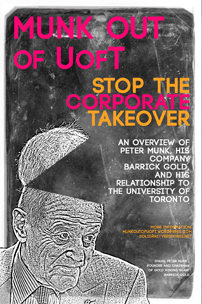Corporate social responsibility (CSR) is a form of corporate self-regulation. Offered as an alternative to government regulation, CSR is often criticized as a public relations tactic for avoiding oversight.
Corporate Accountability is the alternative to CSR that is pushed for by many NGOs and people’s movements. This policy – the accountability of corporations through legal mechanisms, regulation, and a respect for Free, Prior and Informed Consent (FPIC) is where the focus of study of universities should be.
Must Read: “CIDA’s Anti-oversight Agenda”, by Sakura Saunders
from Corporate Watch (UK):
Corporate social responsibility (CSR) evolved as a response to the threat anti-corporate campaigns pose to companies’ license to operate. But corporate social responsibility is a contradiction in terms. Companies are legally bound to maximise profits to shareholders. This duty to make money above all other considerations means that corporations can only be ‘socially responsible’ if they are being insincere. Any doubtful social benefits from CSR are outweighed by the losses to society in other areas. CSR is an effective strategy for: bolstering a company’s public image; avoiding regulation; gaining legitimacy and access to markets and decision-makers; and shifting the ground towards privatisation of public functions. CSR enables business to propose ineffective, voluntary, market-based solutions to social and environmental crises under guise of being responsible. This deflects blame for problems caused by corporate operations away from the company, and protects companies’ interests while hampering efforts to tackle the root causes of social and environmental injustice.
CSR does not pose any sustainable solutions. It can easily be reversed if the economic climate changes. As well as being voluntary, it reinforces rather than challenges the power of corporations. A genuinely socially responsible company would look so different from today’s corporations as to be unrecognisable.
Tackling the big issues of overconsumption, climate change and massive economic inequality requires major shifts in our lifestyles and systems of social organisation. CSR seems to present us with an easy alternative – using corporate power as a lever for social change rather than seeing it as an obstacle.
Ultimately, CSR is not a step towards a more fundamental reform of the corporate structure but a distraction from it. Exposing and rejecting CSR is a step towards addressing corporate power.


Pingback: Welcome to the campaign to end Barrick’s influence at the University of Toronto | Peter Munk OUT of UofT
Hey I was just wondering if you were aware of the Devonshire Initiative. I’m from uOttawa and there is a sketchy agreement that has just been made to fund CSR research by our university, paid for completely by the mining industry. Email me back if you want more info or if you have any suggestions as to go about fighting this because it seems very similar to the Munk situation re: corporatization of education.
Hey there! how can I e-mail you to get more info? Wanna hit us up at munkoutofuoft@gmail.com? I would love to know more!
What this article fails to address is the difference between traditional CSR, in which profit is inevitably the bottom line (ie. CSR for good PR); and strategic CSR. Strategic CSR finds a solution to this spurious practice by turning CSR policies into a source of profit.
Wendy Werner (2009) provides an excellent example of such strategic CSR practices in her study of Square group in Bangladesh. Square group promotes fair hiring practices with regard to sex, and designs its work environment and employee benefits to address the needs of female workers. The result of this is a very loyal workforce and a lower turnover rate.
*Werner, Wendy J. “Corporate Social Responsibility Initiatives Addressing Social Exclusion in Bangladesh.” Journal of Health, Population, & Nutrition 27.4 (2009): 545-62. Print.
There are small areas where good business practices are also socially responsible, but that does not replace the need for accountability within industries (esp. those industries that are often and continually accused of serious human rights abuses and environmental devastation.) It is this sort of accountability that Munk’s company is strategically opposing, with paid lobbyists, libel threats, and public gifts. Meanwhile, they are promoting the concept of CSR as a means to argue that corporate accountability is unneeded.
I agree with you completely. I actually think we are using different terms for the same idea. The word strategic does seem to have a connotation which resembles underhandedness, but the way that I am using it bears more of a resemblance to the accountability that you are talking about.
Regardless, the success of any kind of corporate accountability hinges on both transparent operations and an involved population. I don’t believe we have either of the two. There is a huge lack of transparency and no large social movement for corporate accountability outside of universities and select NIMBY groups. Frustrating, to say the least, but those are the two hurdles that are most apparent to me. Both are paramount to the success of holistic accountability.
(if there is a large movement for transparency, please do not hesitate to inform me of it)
Hey, I think there is a mistake here. CSR is not one of the three streams that Munk kids choose from. The three streams are Global Institutions, Civil Society, and Global Markets: http://munkschool.utoronto.ca/mga/about-mga/about-the-mga/ ..In fact, I don’t even think there is a course on CSR at all….
Hi there, yeah.. this was written a while ago, so the Munk School must have updated their curriculum. I will update soon! Thanks for pointing that out.
i agree with your points, even capitalists agree, for example anticsr.com